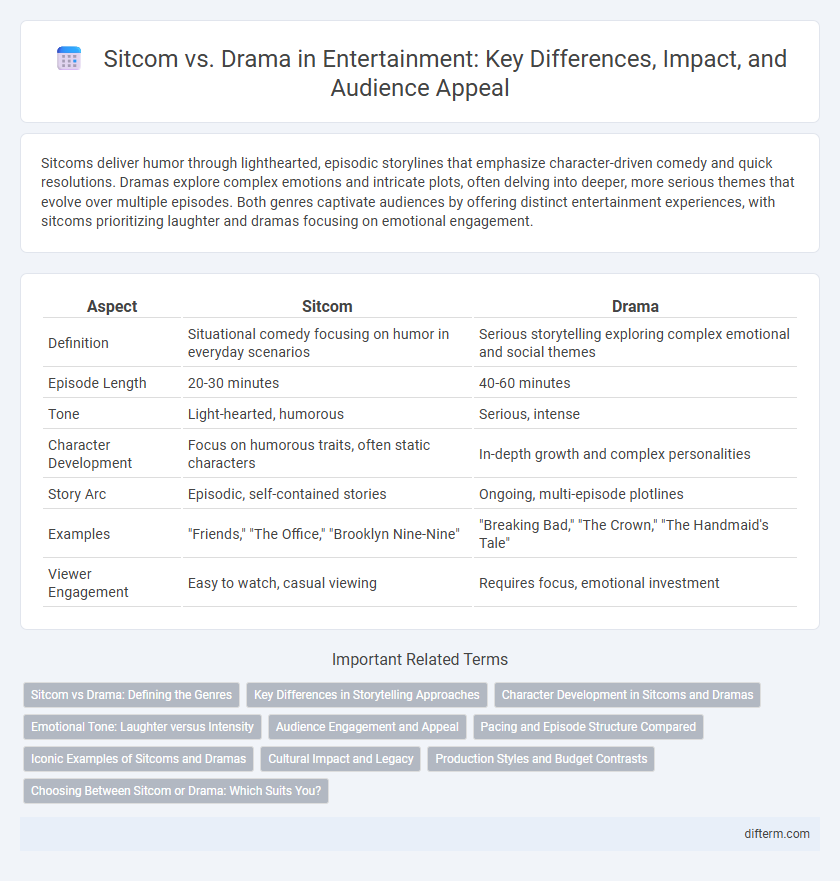Sitcoms deliver humor through lighthearted, episodic storylines that emphasize character-driven comedy and quick resolutions. Dramas explore complex emotions and intricate plots, often delving into deeper, more serious themes that evolve over multiple episodes. Both genres captivate audiences by offering distinct entertainment experiences, with sitcoms prioritizing laughter and dramas focusing on emotional engagement.
Table of Comparison
| Aspect | Sitcom | Drama |
|---|---|---|
| Definition | Situational comedy focusing on humor in everyday scenarios | Serious storytelling exploring complex emotional and social themes |
| Episode Length | 20-30 minutes | 40-60 minutes |
| Tone | Light-hearted, humorous | Serious, intense |
| Character Development | Focus on humorous traits, often static characters | In-depth growth and complex personalities |
| Story Arc | Episodic, self-contained stories | Ongoing, multi-episode plotlines |
| Examples | "Friends," "The Office," "Brooklyn Nine-Nine" | "Breaking Bad," "The Crown," "The Handmaid's Tale" |
| Viewer Engagement | Easy to watch, casual viewing | Requires focus, emotional investment |
Sitcom vs Drama: Defining the Genres
Sitcoms feature episodic humor centered around consistent characters in familiar settings, emphasizing comedic timing and punchlines to engage audiences. Dramas focus on complex storylines and character development, often exploring emotional and social conflicts to create deeper viewer investment. Understanding the distinct narrative structures and audience expectations helps differentiate sitcoms from dramas in entertainment media.
Key Differences in Storytelling Approaches
Sitcoms employ humor-driven, episodic storytelling with self-contained plots and consistent character dynamics, emphasizing lighthearted scenarios and quick resolutions. Dramas focus on complex narratives with character development, emotional depth, and ongoing story arcs that explore serious themes and conflicts over multiple episodes. The pacing in sitcoms is typically faster and centered on punchlines, while dramas allow slower, more introspective storytelling to build tension and emotional engagement.
Character Development in Sitcoms and Dramas
Sitcoms prioritize humor and often feature character development through recurring comedic traits and situational growth, creating relatable yet exaggerated personalities. Dramas invest heavily in complex character arcs, exploring emotional depth, moral dilemmas, and transformative experiences over prolonged episodes or seasons. Both genres utilize character development to engage audiences, but dramas typically provide a more nuanced and evolving portrayal of human behavior.
Emotional Tone: Laughter versus Intensity
Sitcoms thrive on humor and lighthearted scenarios, creating an emotional tone that encourages laughter and relaxation. Dramas emphasize intense, often complex emotional experiences, exploring conflict, passion, and tension to deeply engage viewers. The contrast in emotional tone shapes audience expectations, with sitcoms offering escapism and dramas delivering emotional depth.
Audience Engagement and Appeal
Sitcoms often captivate audiences through humor and relatable daily scenarios, fostering a sense of comfort and routine that enhances viewer loyalty. Dramas engage audiences by delivering complex characters and emotionally charged storylines, driving deeper emotional investment and prolonged attention. Both genres appeal differently; sitcoms attract those seeking light, consistent entertainment, while dramas draw viewers interested in intense, thought-provoking narratives.
Pacing and Episode Structure Compared
Sitcoms typically feature fast-paced narratives with self-contained episodes lasting 20 to 30 minutes, emphasizing humor and quick resolution of conflicts. Dramas often employ slower pacing, with episodes ranging from 40 to 60 minutes that build complex story arcs and character development over multiple installments. The episodic structure in sitcoms favors standalone plots with recurring characters, whereas dramas use serialized storytelling to enhance emotional depth and long-term engagement.
Iconic Examples of Sitcoms and Dramas
Friends, Seinfeld, and The Office stand as iconic sitcoms known for their humor and memorable characters, shaping comedic television history. In contrast, dramas like Breaking Bad, The Sopranos, and Mad Men are celebrated for their intense storytelling, complex characters, and emotional depth. These shows exemplify the distinct narrative styles and audience appeals that differentiate sitcoms from dramas in the entertainment industry.
Cultural Impact and Legacy
Sitcoms like "Friends" and "The Office" have shaped popular culture by creating relatable humor and catchphrases that resonate across generations, fostering a communal viewing experience. Dramas such as "Breaking Bad" and "The Sopranos" have elevated television storytelling through complex characters and morally ambiguous narratives, influencing modern scriptwriting and character development. Both genres leave enduring legacies by reflecting societal values and sparking conversations about human behavior and cultural norms.
Production Styles and Budget Contrasts
Sitcoms typically employ multi-camera setups on sound stages, allowing for quicker production cycles and lower budgets compared to dramas, which often use single-camera techniques with on-location shoots requiring more extensive crew and equipment. Budget contrasts are evident as dramas allocate more funds to cinematography, special effects, and detailed set designs, whereas sitcoms focus spending on writing, comedic timing, and audience interaction. This divergence in production styles influences overall pacing, narrative depth, and viewer engagement across the two genres.
Choosing Between Sitcom or Drama: Which Suits You?
Choosing between sitcom and drama hinges on your preference for tone and pacing, as sitcoms prioritize humor and episodic storylines while dramas emphasize character development and complex narratives. Sitcoms like "Friends" offer lighthearted entertainment ideal for casual viewing, whereas dramas such as "Breaking Bad" provide emotional depth and intricate plots suited for immersive experiences. Assess your mood and time commitment to select the genre that best aligns with your entertainment goals.
sitcom vs drama Infographic

 difterm.com
difterm.com